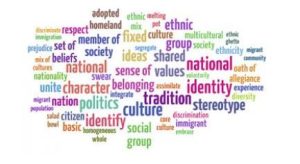What constitutes national identity around the globe?
Peoples around the world are divided over what defines national identity, according to a new survey of more than 20 countries.
The survey, by the Washington-based think tank the Pew Research Center, found countries differ over whether things like birthplace, religion and language are requirements for national belonging an identity.
Across all of the countries surveyed, a median of 91 per cent of people say being able to speak their country’s most common language is most important for being considered a true national, and 81 per cent say sharing their country’s customs and traditions is important for true belonging.
 In Australia, 85 per cent say language is important as a signpost of national identity and 81 per cent say observing customs and traditions are important.
In Australia, 85 per cent say language is important as a signpost of national identity and 81 per cent say observing customs and traditions are important.
“Of the four dimensions of national identity included in the survey, language is by far the most valued. In all countries where we asked about it, about eight-in-ten or more point to language as important for true belonging in the country. And in 13 countries, at least six-in-ten consider it a very important factor,” the report said.
“Participation in a country’s customs and traditions is also valued: Around seven-in-ten or more consider sharing national customs and traditions important for true belonging in most countries. Emphasis on shared customs has declined somewhat since 2016, including by double digits in Germany, Japan and the United Kingdom,” it said.
But views on the importance of birthplace and religion to national identity are mixed.
“The connection between birthplace and national identity is somewhat weaker. Majorities in about half of the countries say being born there is important for truly belonging.
“The middle-income countries surveyed place greater emphasis on birthplace than the high-income countries in the study. At least three-quarters in all seven middle-income countries believe being born in their country is important for being considered a true national.
In Australia 72 per cent of people say being born in Australian is not important to national identities.
“Views on religion as a component of national identity vary significantly across the nations surveyed, with several middle-income countries especially likely to consider it important. In contrast, fewer than one-in-four think being a member of the predominant religion is important to true belonging in the high-income countries of Australia, France, Spain and Sweden.
In Australia, 82 per cent of people says religion is not an important indication of national identity.
The US stands out for having the lowest share who say speaking the country’s most common language is important for being a true national (78 per cent).
A relatively low share of Americans say the same about participating in the country’s traditions (71 per cent). On the other hand, those in the US place more emphasis on being a member of the country’s primary religion than people in most other high-income countries surveyed (37 per cent).
The report says that who counts as a true national can be a partisan issue in many countries, and those on the ideological right generally consider more factors important for belonging.
“The US sees some of the greatest ideological divides, with conservative Americans at least 30 percentage points more likely than liberals to consider each component we asked about important for being truly American. The gap is most pronounced when it comes to religion: Conservatives are 44 points more likely than liberals to say being a Christian is important for being truly American,” the report says.
It says that age, education, religion are also polarising factors.
“Older adults tend to place greater importance on many of the components of national identity we asked about. The age divide is especially notable in Canada, Germany, Japan, South Korea, Sweden and the US, where older adults consider all factors included in the survey as more important for true belonging,” the report says.
“For example, Canadians ages 40 and older are at least 10 points more likely than those ages 18 to 39 to label each dimension as important to Canadian identity.”
“Views also differ between those with more education and those with less. In most countries, those with less education tend to see being born in the country and being a member of the country’s primary religion as important components of national identity.
“Religious identity is linked to views of national identity. Most, if not all, factors are seen as more important by members of the country’s primary religion in most places surveyed. In comparison, those who do not ascribe to the country’s most common religion place less importance on each factor.
“For example, in the US, Christians are more likely than those of other religious affiliations – including those who are atheist, agnostic or say their religion is “nothing in particular” – to see being Christian, being born in the US, speaking English, and sharing US customs and traditions as important for being truly American.”
Read the full report: Language and Traditions – Key Parts of National Identity in Over 20 Countries | Pew Research Center












